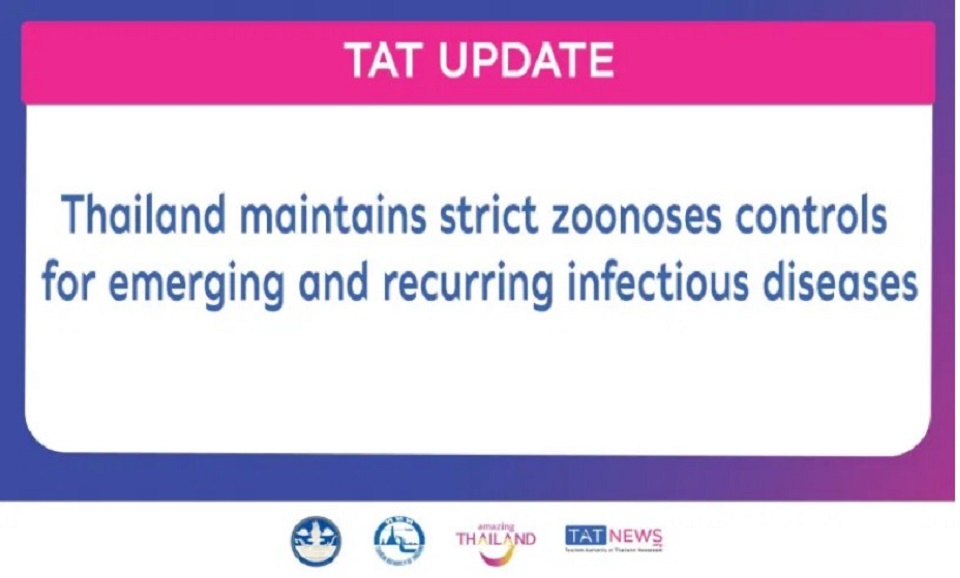
The Tourism Authority of Thailand (TAT) would like to share the clarification from the World Health Organisation (WHO),Thailand’s Ministry of Public Health and Ministry of Natural Resources and Environment regarding recent claims about COVID-19 zoonoses transmission in the country.
According to a WHO statement on 24 February, one member of an international group of WHO experts undertaking a series of studies on the origins of the virus that caused the COVID-19 pandemic was recently misquoted as suggesting the origin of the virus was Thailand.
The WHO clarified that there is no current evidence to suggest this, and that the article in question with the misquote has since been corrected. WHO also stated that its team only recently concluded its mission to China and is still currently working on its report.
Thailand’s Department of Disease Control (DDC), Ministry of Public Health, and the Department of National Park Wildlife and Plant Conservation (DNP), Ministry of Natural Resources and Environment, have stepped forward to clarify that recent claims in international media that the coronavirus strains found in Wuhan actually originated from Thailand were unfounded.
Thailand has strict controls on zoonoses and the prevention of emerging and recurring infectious diseases. The DDC in collaboration with the DNP and the Thai Red Cross Emerging Infectious Disease Health Science Centre of the King Chulalongkorn Memorial Hospital, have conducted long-standing research to see whether there is a chance of animal to human transmission.
Samples were also collected for wildlife species in Thailand at the beginning of COVID-19 because there was suspicion that this infection comes from animals. However, there is no clear evidence what species it came from, thus the conclusion remains unclear, so it is important to focus on academic and scientific evidence. But the research did show that some wildlife species are a common source of many viral diseases, and the coronavirus found in them had a similar genetic code (91.5% similar) to the COVID-19 virus; however, this variant is not transmissible to humans.
Therefore, from these findings, the best advice is that people should not hunt or eat wild animals as the best disease prevention measure.
The DDC and DNP as well as the Department of Livestock also cooperated on a project to prevent disease transmission from animals to humans while monitoring and searching for hidden pathogens. The government agencies also discussed possible action plans for prevention and eradication of the coronavirus in wildlife markets.
In Bangkok, there has also been ongoing cooperation to clean and monitor five wildlife and pet markets on a regular basis. Thailand has already given priority to ongoing surveillance, and there is still no evidence of any problems. The DNP also confirmed that it tested many wildlife species for COVID-19 in their natural habitats, and all wildlife tested were safe.
On 19 March, 2020, the DNP also conducted a survey of commercial animals in these five locations. The samples were collected to detect infection in all animal groups; such as, squirrels, cats, dogs, rats, rabbits, and animals not native to Thailand; such as, marmosets, hedgehogs, meerkats, sugar gliders, and more. All the results were negative.
Therefore, the information that Thailand may be the source of the spread of the Coronavirus 2019 (SARS-CoV-2) is not true at all. Breeding and trading of foreign animals that are legally imported is monitored by the DNP with continued vigilance for the prevention of disease transmission from wild animals to humans.
Regarding recent news reports that the virus was found in some species living in wildlife sanctuaries in the east of Thailand, Thai researchers from Chulalongkorn University, Faculty of Forestry, Kasetsart University, and the DNP visited many caves in June 2020 and collected dropping and blood samples of wildlife in their natural habitat. Their research collaborated with Duke-NUS University’s Emerging Disease Education and Research Programme that found only 91% of the virus detected was genetically similar to the Coronavirus 2019 and cannot cause disease in humans.
In addition, the DNP has been proactively conducting a Coronavirus 2019 survey of wildlife species in other natural habitats, as well as other animals that may be intermediaries. This ongoing work monitors for emerging diseases or mutations and is done while also conducting a PR campaign to prohibit the hunting and consumption of wildlife and prevent disease transmission disease from animals to humans.
TAT is constantly providing updates on the tourism-related COVID-19 situation in Thailand at the TAT Newsroom (www.tatnews.org); Facebook (tatnews.org); and Twitter (Tatnews_Org).
For additional information and assistance relating to Thailand’s tourism, contact the TAT Contact Centre 1672 or Tourist Police 1155.





